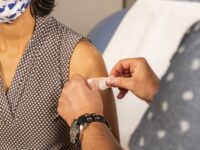In the excitement of getting a COVID-19 vaccine, perhaps you decide to share a picture of your new vaccine card on social media. As innocent as that may seem, it can cause you some headaches in the long run. That’s because COVID-19 vaccine card scams are cropping up around the country. Even the FBI is warning against posting a picture of your card.
Here’s how it works: The card that you post to social media has important identifying information, including your name, date of birth, and perhaps even your health insurance information. However, thieves could take that information to steal your identity. For this reason, the FBI advised the public earlier this month to not post any pictures of a COVID-19 vaccine card. If you’ve already posted online a picture of a vaccine card, remove it immediately for your own protection.
Yet that’s not the only COVID-19 vaccine card scam happening. There also are reports of people selling fraudulent copies of vaccine cards. Fraudsters have gone so far as to use two different inks on the card, so it looks as if a person showed up two different times for a two-shot vaccine. A fake vaccine card may benefit someone who doesn’t want to get a vaccine but thinks they will need one for work or travel purposes. These cards have even been sold on well-known retail sites such as eBay. One investigation found that a person selling some of these fraudulent cards was a pharmacist.
If you’ve already received a COVID-19 vaccine, here are a few ways to keep your card safe:
1. Place the card in a safe area, such as with other medical records.
2. Don’t carry the card with you, but keep it somewhere that you can easily access it.
3. Don’t laminate the card. It’s unclear yet if the card will be used for future booster shots.
In the event that it is, you’ll want health workers to be able to write on it.
4. If you want to let others on social media know that you’ve received the vaccine, share a picture of your vaccine sticker, if you received one. Or, find another way to commemorate the shot without revealing personal information.
5. If you lose your card, ask the place where you received your vaccine for a replacement card. If you don’t recall where you received your vaccine, the CDC has a list of agencies that track vaccination information for each state. That can serve as a starting point. However, the CDC does not keep vaccine records.
6. Don’t respond to messages that purport to offer a COVID-19 vaccine passport. There is no vaccine passport yet, and such messages could just be a way to try and capture your personal information.
Call Secure Aging to Find Out How We Can Help Seniors With Care Management
At Secure Aging in Bradenton, we transform the weight of the world into a sigh of relief for our senior clients and their concerned family members. The mission of Secure Aging is to protect and preserve our client’s independence and dignity through careful and thoughtful financial and care management. As our clients age, it is their desire to remain independent and age with dignity. Our services protect our clients from talented con artists looking to exploit and deplete the financial resources of our vulnerable seniors. Secure Aging helps families in Manatee County and Sarasota County and in and around the communities of Anna Maria, Bradenton, Bradenton Beach, Ellenton, Holmes Beach, Lakewood Ranch, Longboat Key, Myakka City, Palmetto, Parrish, and Sarasota. Call us at 941-761-9338, or visit us online at www.secureaging.com.




Comments are closed